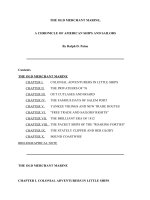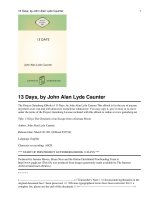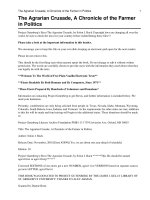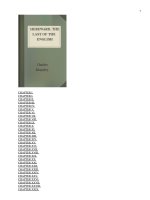The last chronicle of barset
Bạn đang xem bản rút gọn của tài liệu. Xem và tải ngay bản đầy đủ của tài liệu tại đây (3.18 MB, 903 trang )
The Project Gutenberg eBook, The Last Chronicle of Barset, by Anthony
Trollope
ThiseBookisfortheuseofanyoneanywhereatnocostandwith
almostnorestrictionswhatsoever.Youmaycopyit,giveitawayor
re-useitunderthetermsoftheProjectGutenbergLicenseincluded
withthiseBookoronlineatwww.gutenberg.org
Title:TheLastChronicleofBarset
Author:AnthonyTrollope
ReleaseDate:January,2002[eBook#3045]
[Mostrecentlyupdated:December29,2011]
Language:English
Charactersetencoding:ISO-8859-1
***START OF THE PROJECT GUTENBERG EBOOK THE LAST
CHRONICLEOFBARSET***
E-textpreparedbyKennethDavidCooper
andrevisedbyJosephE.Loewenstein,M.D.
HTMLversionpreparedby
JosephE.Loewenstein,M.D.,andDelphineLettau
TheillustrationsbyGeorgeHousmanThomasinthisHTMLfileweretakenfromtheFirstEditionofThe
LastChronicleofBarset(Smith,ElderandCo.,London,1867).
Mr.CrawleybeforetheMagistrates.
Mr.CrawleybeforetheMagistrates.
ClicktoENLARGE
THELASTCHRONICLE
OFBARSET
by
ANTHONYTROLLOPE
Firstpublishedinmonthlyinstallments
fromDecember1,1866,toJuly6,1867,
andinbookformin1867
CONTENTS
I. HowDidHeGetIt?
II. ByHeavensHeHadBetterNot!
III. TheArchdeacon'sThreat.
IV. TheClergyman'sHouseatHogglestock.
V. WhattheWorldThoughtAboutIt.
VI. GraceCrawley.
VII. MissPrettyman'sPrivateRoom.
VIII. Mr.CrawleyIsTakentoSilverbridge.
IX. GraceCrawleyGoestoAllington.
X. DinneratFramleyCourt.
XI. TheBishopSendsHisInhibition.
XII. Mr.CrawleySeeksforSympathy.
XIII. TheBishop'sAngel.
XIV. MajorGrantlyConsultsaFriend.
XV. UpinLondon.
XVI. DownatAllington.
XVII. Mr.CrawleyIsSummonedtoBarchester.
XVIII. TheBishopofBarchesterIsCrushed.
XIX. WhereDidItComeFrom?
XX. WhatMr.WalkerThoughtAboutIt.
XXI. Mr.RobartsonHisEmbassy.
XXII. MajorGrantlyatHome.
XXIII. MissLilyDale'sResolution.
XXIV. Mrs.DobbsBroughton'sDinner-party.
XXV. MissMadalinaDemolines.
XXVI. ThePicture.
XXVII. AHeroatHome.
XXVIII. ShowingHowMajorGrantlyTookaWalk.
XXIX. MissLilyDale'sLogic.
XXX. ShowingWhatMajorGrantlyDidAfterHisWalk.
XXXI. ShowingHowMajorGrantlyReturnedtoGuestwick.
XXXII. Mr.Toogood.
XXXIII. ThePlumsteadFoxes.
XXXIV. Mrs.ProudieSendsforHerLawyer.
XXXV. LilyDaleWritesTwoWordsinHerBook.
XXXVI. GraceCrawleyReturnsHome.
XXXVII. HookCourt.
XXXVIII. Jael.
XXXIX. ANewFlirtation.
XL. Mr.Toogood'sIdeasAboutSociety.
XLI. GraceCrawleyatHome.
XLII. Mr.ToogoodTravelsProfessionally.
XLIII. Mr.CrosbieGoesintotheCity.
XLIV. "ISupposeIMustLetYouHaveIt."
XLV. LilyDaleGoestoLondon.
XLVI. TheBayswaterRomance.
XLVII. Dr.TempestatthePalace.
XLVIII. TheSoftnessofSirRaffleBuffle.
XLIX. NeartheClose.
L. LadyLufton'sProposition.
LI. Mrs.DobbsBroughtonPilesHerFagots.
LII. WhyDon'tYouHavean"It"forYourself?
LIII. RottenRow.
LIV. TheClericalCommission.
LV. FramleyParsonage.
LVI. TheArchdeaconGoestoFramley.
LVII. ADoublePledge.
LVIII. TheCross-grainednessofMen.
LIX. ALadyPresentsHerComplimentstoMissL.D.
LX. TheEndofJaelandSisera.
LXI. "It'sDoggedasDoesIt."
LXII. Mr.Crawley'sLettertotheDean.
LXIII. TwoVisitorstoHogglestock.
LXIV. TheTragedyinHookCourt.
LXV. MissVanSieverMakesHerChoice.
LXVI. RequiescatinPace.
LXVII. InMemoriam.
LXVIII. TheObstinacyofMr.Crawley.
LXIX. Mr.Crawley'sLastAppearanceinHisOwnPulpit.
LXX. Mrs.ArabinIsCaught.
LXXI. Mr.ToogoodatSilverbridge.
LXXII. Mr.Toogoodat"TheDragonofWantly."
LXXIII. ThereIsComfortatPlumstead.
LXXIV. TheCrawleysAreInformed.
LXXV. Madalina'sHeartIsBleeding.
LXXVI. IThinkHeIsLightofHeart.
LXXVII. TheShatteredTree.
LXXVIII. TheArabinsReturntoBarchester.
LXXIX. Mr.CrawleySpeaksofHisCoat.
LXXX. MissDemolinesDesirestoBecomeaFinger-post.
LXXXI. BarchesterCloisters.
LXXXII. TheLastSceneatHogglestock.
LXXXIII. Mr.CrawleyIsConquered.
LXXXIV. Conclusion.
ILLUSTRATIONS
Mr.CrawleybeforetheMagistrates.
Frontispiece
Mr.andMrs.Crawley.
ChapterI
"Iloveyouasthoughyouweremyown,"
ChapterVI
saidtheSchoolmistress.
"Aconvictedthief,"repeatedMrs.Proudie. ChapterXI
"Speakout,Dan."
ChapterXII
GraceCrawleyisintroducedtoSquireDale. ChapterXVI
FarmerMangleandMr.Crawley.
ChapterXVII
"She'smorelikeEleanorthananyoneelse." ChapterXXII
"Iamverygladtohavetheopportunity
ChapterXXIV
ofshakinghandswithyou."
"Whatdoyouthinkofit,Mrs.Broughton?" ChapterXXVI
SquireDaleandMajorGrantly.
ChapterXXVIII
"NevermindMr.Henry."
ChapterXXXIII
Lilywishesthattheymightsweartobe
ChapterXXXV
BrotherandSister.
Shereadthebeginning—"DearestGrace." ChapterXXXVI
"Mamma,I'vegotsomethingtotellyou."
Mr.ToogoodandtheoldWaiter.
Theypronouncedhertobeverymuch
likeaLady.
"Asrightasatrivet,Uncle."
PosyandherGrandpapa.
Mrs.DobbsBroughtonpilesherFagots.
"BecauseofPapa'sdisgrace."
"Butitwillneverpassaway,"saidGrace.
"HonourthyFather,—thatthydays
maybelongintheLand."
"It'sdoggedasdoesit."
Mrs.Proudie'sEmissary.
"Youdonotknowwhatstarvingis,
mydear."
"Theywillcometoheararuinedman
declarehisownruin."
"Nosaleafterall?"
"ThesearetheyoungHogglestockians,
arethey?"
ThelastDenial.
"WhatisitthatIbehold?"
"PeradventurehesignifieshisConsent."
CHAPTERI.
HOWDIDHEGETIT?
ChapterXLI
ChapterXLII
ChapterXLV
ChapterXLVIII
ChapterXLIX
ChapterLI
ChapterLV
ChapterLVII
ChapterLVIII
ChapterLXI
ChapterLXIII
ChapterLXV
ChapterLXIX
ChapterLXXI
ChapterLXXIV
ChapterLXXVII
ChapterLXXX
ChapterLXXXII
Illustrationcanneverbringmyselftobelieveit,John,"saidMaryWalker,the
pretty daughter of Mr. George Walker, attorney of Silverbridge. Walker and
Winthropwasthenameofthefirm,andtheywererespectablepeople,whodid
allthesolicitors'businessthathadtobedoneinthatpartofBarsetshireonbehalf
oftheCrown,wereemployedonthelocalbusinessoftheDukeofOmniumwho
is great in those parts, and altogether held their heads up high, as provincial
lawyers often do. They,—the Walkers,—lived in a great brick house in the
middle of the town, gave dinners, to which the county gentlemen not
unfrequently condescended to come, and in a mild way led the fashion in
Silverbridge."Icanneverbringmyselftobelieveit,John,"saidMissWalker.
"You'llhavetobringyourselftobelieveit,"saidJohn,withouttakinghiseyes
fromhisbook.
"Aclergyman,—andsuchaclergymantoo!"
"Idon'tseethatthathasanythingtodowithit."Andashenowspoke,John
didtakehiseyesoffhisbook."Whyshouldnotaclergymanturnthiefaswellas
anybodyelse?Yougirlsalwaysseemtoforgetthatclergymenareonlymenafter
all."
"Theirconductislikelytobebetterthanthatofothermen,Ithink."
"Idenyitutterly,"saidJohnWalker."I'llundertaketosaythatatthismoment
therearemoreclergymenindebtinBarsetshirethanthereareeitherlawyersor
doctors. This man has always been in debt. Since he has been in the county I
don't think he has ever been able to show his face in the High Street of
Silverbridge."
"John,thatissayingmorethanyouhavearighttosay,"saidMrs.Walker.
"Why,mother,thisverychequewasgiventoabutcherwhohadthreateneda
fewdaysbeforetopostbillsallaboutthecounty,givinganaccountofthedebt
thatwasduetohim,ifthemoneywasnotpaidatonce."
"MoreshameforMr.Fletcher,"saidMary."Hehasmadeafortuneasbutcher
inSilverbridge."
"What hasthattodowithit?Ofcourseamanlikestohavehismoney.He
hadwrittenthreetimestothebishop,andhehadsentamanovertoHogglestock
togethislittlebillsettledsixdaysrunning.Youseehegotitatlast.Ofcourse,a
tradesmanmustlookforhismoney."
"Mamma, do you think that Mr. Crawley stole the cheque?" Mary, as she
askedthequestion,cameandstoodoverhermother,lookingatherwithanxious
eyes.
"Iwouldrathergivenoopinion,mydear."
"Butyoumustthinksomethingwheneverybodyistalkingaboutit,mamma."
"Ofcoursemymotherthinkshedid,"saidJohn,goingbacktohisbook."Itis
impossiblethatsheshouldthinkotherwise."
"That is not fair, John," said Mrs. Walker; "and I won't have you fabricate
thoughtsforme,orputtheexpressionofthemintomymouth.Thewholeaffair
isverypainful,andasyourfatherisengagedintheinquiry,Ithinkthattheless
saidaboutthematterinthishousethebetter.Iamsurethatthatwouldbeyour
father'sfeeling."
"OfcourseIshouldsaynothingaboutitbeforehim,"saidMary."Iknowthat
papadoesnotwishtohaveittalkedabout.Buthowisonetohelpthinkingabout
suchathing?ItwouldbesoterribleforallofuswhobelongtotheChurch."
"Idonotseethatatall,"saidJohn."Mr.Crawleyisnotmorethananyother
manjustbecausehe'saclergyman.Ihateallthatkindofclap-trap.Therearea
lotofpeoplehereinSilverbridgewhothinkthemattershouldn'tbefollowedup,
just because the man is in a position which makes the crime more criminal in
himthanitwouldbeinanother."
"ButIfeelsurethatMr.Crawleyhascommittednocrimeatall,"saidMary.
"Mydear,"saidMrs.Walker,"IhavejustsaidthatIwouldratheryouwould
nottalkaboutit.Papawillbeindirectly."
"Iwon't,mamma;—only—"
"Only!yes;justonly!"saidJohn."She'dgoontilldinnerifanyonewould
staytohearher."
"You've said twice as much as I have, John." But John had left the room
beforehissister'slastwordscouldreachhim.
"You know, mamma, it is quite impossible not to help thinking of it," said
Mary.
"Idaresayitis,mydear."
"Andwhenoneknowsthepeopleitdoesmakeitsodreadful."
"Butdoyouknowthem?IneverspoketoMr.Crawleyinmylife,andIdo
notthinkIeversawher."
"IknewGraceverywell,—whensheusedtocomefirsttoMissPrettyman's
school."
"Poorgirl.Ipityher."
"Pityher!Pityisnowordforit,mamma.Myheartbleedsforthem.AndyetI
donotbelievefora momentthathestole thecheque.Howcanitbepossible?
Forthoughhemayhavebeenindebtbecausetheyhavebeensovery,verypoor;
yet we all know that he has been an excellent clergyman. When the Robartses
werediningherelast,IheardMrs.Robartssaythatforpietyanddevotiontohis
dutiesshehadhardlyeverseenanyoneequaltohim.AndtheRobartsesknow
moreofthemthananybody."
"Theysaythatthedeanishisgreatfriend."
"WhatapityitisthattheArabinsshouldbeawayjustnowwhenheisinsuch
trouble." And in this way the mother and daughter went on discussing the
questionoftheclergyman'sguiltinspiteofMrs.Walker'spreviouslyexpressed
desire that nothing more might be said about it. But Mrs. Walker, like many
othermothers,wasapttobemorefreeinconversewithherdaughterthanshe
was with her son. While they were thus talking the father came in from his
office,andthenthesubjectwasdropped.Hewasamanbetweenfiftyandsixty
yearsofage,withgreyhair,rathershort,andsomewhatcorpulent,butstillgifted
with that amount of personal comeliness which comfortable position and the
respect of others will generally seem to give. A man rarely carries himself
meanly,whomtheworldholdshighinesteem.
"Iamverytired,mydear,"saidMr.Walker.
"You look tired. Come and sit down for a few minutes before you dress.
Mary,getyourfather'sslippers."Maryinstantlyrantothedoor.
"Thanks,mydarling,"saidthefather.Andthenhewhisperedtohiswife,as
soonasMarywasoutofhearing,"Ifearthatunfortunatemanisguilty.Ifearhe
is!Ifearheis!"
"Oh,heavens!whatwillbecomeofthem?"
"Whatindeed?Shehasbeenwithmeto-day."
"Hasshe?Andwhatcouldyousaytoher?"
"ItoldheratfirstthatIcouldnotseeher,andbeggedhernottospeaktome
aboutit.Itriedtomakeherunderstandthatsheshouldgotosomeoneelse.But
itwasofnouse."
"Andhowdiditend?"
"Iaskedhertogointoyou,butshedeclined.Shesaidyoucoulddonothing
forher."
"Anddoesshethinkherhusbandguilty?"
"No,indeed.Shethinkhimguilty!Nothingonearth,—orfromheaveneither,
asItakeit,wouldmakehersupposeittobepossible.Shecametomesimplyto
tellmehowgoodhewas."
"Iloveherforthat,"saidMrs.Walker.
"So did I. But what is the good of loving her? Thank you, dearest. I'll get
yourslippersforyousomeday,perhaps."
ThewholecountywasastirinthismatterofthisallegedguiltoftheReverend
Josiah Crawley,—the whole county, almost as keenly as the family of Mr.
Walker,ofSilverbridge.Thecrimelaidtohischargewasthetheftofacheque
fortwentypounds,whichhewassaidtohavestolenoutofapocket-bookleftor
dropped in his house, and to have passed as money into the hands of one
Fletcher,abutcherofSilverbridge,towhomhewasindebted.Mr.Crawleywas
in those days the perpetual curate of Hogglestock, a parish in the northern
extremityofEastBarsetshire;amanknownbyallwhoknewanythingofhimto
beverypoor,—anunhappy,moody,disappointedman,uponwhomthetroubles
oftheworldalwaysseemedtocomewithadoubleweight.Buthehadeverbeen
respected as a clergyman, since his old friend Mr. Arabin, the dean of
Barchester, had given him the small incumbency which he now held. Though
moody,unhappy,anddisappointed,hewasahard-working,conscientiouspastor
among the poor people with whom his lot was cast; for in the parish of
Hogglestock there resided only a few farmers higher in degree than field
labourers, brickmakers, and such like. Mr. Crawley had now passed some ten
yearsofhislifeatHogglestock;andduringthoseyearshehadworkedveryhard
todohisduty,strugglingtoteachthepeoplearoundhimperhapstoomuchofthe
mystery, but something also of the comfort, of religion. That he had become
popularinhisparishcannotbesaidofhim.Hewasnotamantomakehimself
popularinanyposition.Ihavesaidthathewasmoodyanddisappointed.Hewas
even worse than this; he was morose, sometimes almost to insanity. There had
been days in which even his wife had found it impossible to deal with him
otherwisethanaswithanacknowledgedlunatic.Andthiswasknownamongthe
farmers,whotalkedabouttheirclergymanamongthemselvesasthoughhewere
amadman.Butamongtheverypoor,amongthebrickmakersofHoggleEnd,—a
lawless,drunken,terriblyroughlotofhumanity,—hewasheldinhighrespect;
for they knew that he lived hardly, as they lived; that he worked hard, as they
worked;andthattheoutsideworldwashardtohim,asitwastothem;andthere
had been an apparent sincerity of godliness about the man, and a manifest
struggletodohisdutyinspiteoftheworld'sill-usage,whichhadwonitsway
evenwiththerough;sothatMr.Crawley'snamehadstoodhighwithmanyinhis
parish,inspiteoftheunfortunatepeculiarityofhisdisposition.Thiswastheman
whowasnowaccusedofstealingachequefortwentypounds.
But before the circumstances of the alleged theft are stated, a word or two
must be said as to Mr. Crawley's family. It is declared that a good wife is a
crowntoherhusband,butMrs.Crawleyhadbeenmuchmorethanacrownto
him.Ashadregardedalltheinnerlifeoftheman,—allthatportionofhislife
whichhadnotbeenpassedinthepulpitorinpastoralteaching,—shehadbeen
crown,throne,andsceptreallinone.Thatshehadenduredwithhimandonhis
behalf the miseries of poverty, and the troubles of a life which had known no
smiles, is perhaps not to be alleged as much to her honour. She had joined
herself to him for better or worse, and it was her manifest duty to bear such
things; wives always have to bear them, knowing when they marry that they
must take their chance. Mr. Crawley might have been a bishop, and Mrs.
Crawley,whenshemarriedhim,perhapsthoughtitprobablethatsuchwouldbe
his fortune. Instead of that he was now, just as he was approaching his fiftieth
year, a perpetual curate, with an income of one hundred and thirty pounds per
annum,—andafamily.ThathadbeenMrs.Crawley'sluckinlife,andofcourse
sheboreit.Butshehadalsodonemuchmorethanthis.Shehadstrivenhardto
be contented, or, rather, to appear to be contented, when he had been most
wretched and most moody. She had struggled to conceal from him her own
convictionastohishalf-insanity,treatinghimatthesametimewiththerespect
duetoanhonouredfatherofafamily,andwiththecarefulmeasuredindulgence
fit for a sick and wayward child. In all the terrible troubles of their life her
couragehadbeenhigherthanhis.Themetalofwhichshewasmadehadbeen
temperedtoasteelwhichwasveryrareandfine,buttherarenessandfinenessof
which he had failed to appreciate. He had often told her that she was without
pride, because she had stooped to receive from others on his behalf and on
behalfofherchildren,thingswhichwereveryneedful,butwhichshecouldnot
buy.Hehadtoldherthatshewasabeggar,andthatitwasbettertostarvethanto
beg. She had borne the rebuke without a word in reply, and had then begged
againforhim,andhadenduredthestarvationherself.Nothingintheirpoverty
had,foryearspast,beenashametoher;buteveryaccidentoftheirpovertywas
still,andeverhadbeen,alivingdisgracetohim.
Mr.andMrs.Crawley.
Mr.andMrs.Crawley.
ClicktoENLARGE
Theyhadhadmanychildren,andthreewerestillalive.Oftheeldest,Grace
Crawley,weshallhearmuchinthecomingstory.Shewasatthistimenineteen
yearsold,andtherewerethosewhosaidthat,inspiteofherpoverty,hershabby
outwardapparel,andacertainthin,unfledged,unroundedformofperson,awant
offulnessinthelinesofherfigure,shewastheprettiestgirlinthatpartofthe
world.ShewaslivingnowataschoolinSilverbridge,whereforthelastyearshe
hadbeenateacher;andthereweremanyinSilverbridgewhodeclaredthatvery
bright prospects were opening to her,—that young Major Grantly of Cosby
Lodge, who, though a widower with a young child, was the cynosure of all
female eyes in and round Silverbridge, had found beauty in her thin face, and
thatGraceCrawley'sfortunewasmadeintheteeth,asitwere,oftheprevailing
ill-fortuneofherfamily.BobCrawley,whowastwoyearsyounger,wasnowat
Marlbro' School, from whence it was intended that he should proceed to
Cambridge,andbeeducatedthereattheexpenseofhisgodfather,DeanArabin.
Inthisalsotheworldsawastrokeofgoodluck.Butthennothingwasluckyto
Mr.Crawley.Bob,indeed,whohaddoneverywellatschool,mightdowellat
Cambridge,—mightdogreatthingsthere.ButMr.Crawleywouldalmosthave
preferredthattheboyshouldworkinthefields,thanthatheshouldbeeducated
inamannersomanifestlyeleemosynary.Andthenhisclothes!Howwashetobe
providedwithclothesfiteitherforschoolorforcollege?ButthedeanandMrs.
Crawley between them managed this, leaving Mr. Crawley very much in the
dark,asMrs.Crawleywasinthehabitofleavinghim.Thentherewasayounger
daughter, Jane, still at home, who passed her life between her mother's worktable and her father's Greek, mending linen and learning to scan iambics,—for
Mr.Crawleyinhisearlydayshadbeenaripescholar.
And now there had come upon them all this terribly-crushing disaster. That
poorMr.CrawleyhadgraduallygothimselfintoamessofdebtatSilverbridge,
fromwhichhewasquiteunabletoextricatehimself,wasgenerallyknownbyall
theworldbothofSilverbridgeandHogglestock.Toagreatmanyitwasknown
that Dean Arabin had paid money for him, very much contrary to his own
consent, and that he had quarrelled, or attempted to quarrel, with the dean in
consequence,—hadsoattempted,althoughthemoneyhadinpartpassedthrough
his own hands. There had been one creditor, Fletcher, the butcher of
Silverbridge,whohadoflatebeenspeciallyharduponpoorCrawley.Thisman,
whohadnotbeenwithoutgoodnatureinhisdealings,hadheardstoriesofthe
dean's good-will and such like, and had loudly expressed his opinion that the
perpetualcurateofHogglestockwouldshowahigherprideinallowinghimself
to be indebted to a rich brother clergyman, than in remaining under thrall to a
butcher. And thus a rumour had grown up. And then the butcher had written
repeatedletterstothebishop,—toBishopProudieofBarchester,whohadatfirst
caused his chaplain to answer them, and had told Mr. Crawley somewhat
roundlywhatwashisopinionofaclergymanwhoeatmeatanddidnotpayfor
it.ButnothingthatthebishopcouldsayordoenabledMr.Crawleytopaythe
butcher. It was very grievous to such a man as Mr. Crawley to receive these
letters from such a man as Bishop Proudie; but the letters came, and made
festeringwounds,butthentherewasanendofthem.Andatlasttherehadcome
forthfromthebutcher'sshopathreatthatifthemoneywerenotpaidbyacertain
date, printed bills should be posted about the county. All who heard of this in
SilverbridgewereveryangrywithMr.Fletcher,fornoonetherehadeverknown
a tradesman to take such a step before; but Fletcher swore that he would
persevere,anddefendedhimselfbyshowingthatsixorsevenmonthssince,in
thespringoftheyear,Mr.CrawleyhadbeenpayingmoneyinSilverbridge,but
hadpaidnonetohim,—tohimwhohadbeennotonlyhisearliest,buthismost
enduringcreditor."HegotmoneyfromthedeaninMarch,"saidMr.Fletcherto
Mr.Walker,"andhepaidtwelvepoundstentoGreen,andseventeenpoundsto
Grobury, the baker." It was that seventeen pounds to Grobury, the baker, for
flour,whichmadethebutchersofixedlydeterminedtosmitethepoorclergyman
hipandthigh."AndhepaidmoneytoHall,andtoMrs.Holt,andtoadealmore;
buthenevercamenearmyshop.Ifhehadevenshownhimself,Iwouldnothave
saidsomuchaboutit."Andthenadaybeforethedatenamed,Mrs.Crawleyhad
cometoSilverbridge,andhadpaidthebutchertwentypoundsinfourfive-pound
notes.SofarFletcherthebutcherhadbeensuccessful.
Somesixweeksafterthis,inquirybegantobemadeastoacertainchequefor
twentypoundsdrawnbyLordLuftononhisbankersinLondon,whichcheque
hadbeenlostearlyinthespringbyMr.Soames,LordLufton'smanofbusiness
in Barsetshire, together with a pocket-book in which it had been folded. This
pocket-bookSoameshadbelievedhimselftohaveleftatMr.Crawley'shouse,
and had gone so far, even at the time of the loss, as to express his absolute
convictionthathehadsoleftit.HewasinthehabitofpayingarentchargetoMr.
Crawley on behalf of Lord Lufton, amounting to twenty pounds four shillings,
every half-year. Lord Lufton held the large tithes of Hogglestock, and paid
annually a sum of forty pounds eight shillings to the incumbent. This amount
was, as a rule, remitted punctually by Mr. Soames through the post. On the
occasionnowspokenof,hehadhadsomereasonforvisitingHogglestock,and
hadpaidthemoneypersonallytoMr.Crawley.Ofsomuchtherewasnodoubt.
But he had paid it by a cheque drawn by himself on his own bankers at
Barchester, and that cheque had been cashed in the ordinary way on the next
morning.OnreturningtohisownhouseinBarchesterhehadmissedhispocketbook,andhadwrittentoMr.Crawleytomakeinquiry.Therehadbeennomoney
init,beyondthechequedrawnbyLordLuftonfortwentypounds.Mr.Crawley
hadansweredthisletterbyanother,sayingthatnopocket-bookhadbeenfound
inhishouse.AllthishadhappenedinMarch.
InOctober,Mrs.CrawleypaidthetwentypoundstoFletcher,thebutcher,and
inNovemberLordLufton'schequewastracedbackthroughtheBarchesterbank
to Mr. Crawley's hands. A brickmaker of Hoggle End, much favoured by Mr.
Crawley,hadaskedforchangeoverthecounterofthisBarchesterbank,—not,as
willbeunderstood,thebankonwhichthechequewasdrawn—andhadreceived
it. The accommodation had been refused to the man at first, but when he
presentedthechequethesecondday,bearingMr.Crawley'snameonthebackof
it,togetherwithanotefromMr.Crawleyhimself,themoneyhadbeengivenfor
it;andtheidenticalnotessopaidhadbeengiventoFletcher,thebutcher,onthe
nextdaybyMrs.Crawley.Wheninquirywasmade,Mr.Crawleystatedthatthe
chequehadbeenpaidtohimbyMr.Soames,onbehalfoftherentchargedueto
himbyLordLufton.Buttheerrorofthisstatementwasatoncemademanifest.
Therewasthecheque,signedbyMr.Soameshimself,fortheexactamount,—
twenty pounds four shillings. As he himself declared, he had never in his life
paid money on behalf of Lord Lufton by a cheque drawn by his lordship. The
chequegivenbyLordLufton,andwhichhadbeenlost,hadbeenaprivatematter
between them. His lordship had simply wanted change in his pocket, and his
agent had given it to him. Mr. Crawley was speedily shown to be altogether
wronginthestatementmadetoaccountforpossessionofthecheque.
Then he became very moody and would say nothing further. But his wife,
who had known nothing of his first statement when made, came forward and
declaredthatshebelievedthechequefortwentypoundstobeapartofapresent
given by Dean Arabin to her husband in April last. There had been, she said,
great heartburnings about this gift, and she had hardly dared to speak to her
husband on the subject. An execution had been threatened in the house by
Grobury, the baker, of which the dean had heard. Then there had been some
scenesatthedeanerybetweenherhusbandandthedeanandMrs.Arabin,asto
whichshehadsubsequentlyheardmuchfromMrs.Arabin.Mrs.Arabinhadtold
her that money had been given,—and at last taken. Indeed, so much had been
veryapparent,asbillshadbeenpaidtotheamountofatleastfiftypounds.When
thethreatmadebythebutcherhadreachedherhusband'sears,theeffectupon
himhadbeenverygrievous.AllthiswasthestorytoldbyMrs.CrawleytoMr.
Walker,thelawyer,whenhewaspushinghisinquiries.She,poorwoman,atany
rate told all that she knew. Her husband had told her one morning, when the
butcher's threat was weighing heavily on his mind, speaking to her in such a
humour that she found it impossible to cross-question him, that he had still
money left, though it was money which he had hoped that he would not be
driventouse;andhehadgivenherthefourfive-poundnotes,andhadtoldherto
gotoSilverbridgeandsatisfythemanwhowassoeagerforhismoney.Shehad
doneso,andhadfeltnodoubtthatthemoneysoforthcominghadbeengivenby
thedean.ThatwasthestoryastoldbyMrs.Crawley.
Buthowcouldsheexplainherhusband'sstatementastothecheque,which
hadbeenshowntobealtogetherfalse?AllthispassedbetweenMr.Walkerand
Mrs.Crawley,andthelawyerwasverygentlewithher.Inthefirststagesofthe
inquiryhehadsimplydesiredtolearnthetruth,andplacetheclergymanabove
suspicion.Latterly,beingboundashewastofollowthematterupofficially,he
would not have seen Mrs. Crawley, had he been able to escape that lady's
importunity."Mr.Walker,"shehadsaid,atlast,"youdonotknowmyhusband.
NooneknowshimbutI.Itishardtohavetotellyouofallourtroubles.""IfI
canlessenthem,trustmethatIwilldoso,"saidthelawyer."Noone,Ithink,can
lessentheminthisworld,"saidthelady."Thetruthis,sir,thatmyhusbandoften
knowsnotwhathesays.Whenhedeclaredthatthemoneyhadbeenpaidtohim
byMr.Soames,mostcertainlyhethoughtso.Therearetimeswheninhismisery
heknowsnotwhathesays,—whenheforgetseverything."
Up to this period Mr. Walker had not suspected Mr. Crawley of anything
dishonest, nor did he suspect him as yet. The poor man had probably received
themoneyfromthedean,andhadtoldthelieaboutit,notchoosingtoownthat
he had taken money from his rich friend, and thinking that there would be no
further inquiry. He had been very foolish, and that would be the end of it. Mr.
Soameswasbynomeanssogood-naturedinhisbelief."Howshouldmypocketbook have got into Dean Arabin's hands?" said Mr. Soames, almost
triumphantly. "And then I felt sure at the time that I had left it at Crawley's
house!"
Mr.Walkerwrotealettertothedean,whoatthatmomentwasinFlorence,
on his way to Rome, from whence he was going on to the Holy Land. There
came back a letter from Mr. Arabin, saying that on the 17th of March he had
giventoMr.Crawleyasumoffiftypounds,andthatthepaymenthadbeenmade
withfiveBankofEnglandnotesoftenpoundseach,whichhadbeenhandedby
himtohisfriendinthelibraryatthedeanery.Theletterwasveryshort,andmay,
perhaps,bedescribedashavingbeenalmostcurt.Mr.Walker,inhisanxietyto
do the best he could for Mr. Crawley, had simply asked a question as to the
nature of the transaction between the two gentlemen, saying that no doubt the
dean'sanswerwouldclearupalittlemysterywhichexistedatpresentrespecting
achequefortwentypounds.Thedeaninanswersimplystatedthefactasithas
been given above; but he wrote to Mr. Crawley begging to know what was in
truththisnewdifficulty,andofferinganyassistanceinhispower.Heexplained
allthecircumstancesofthemoney,asherememberedthem.Thesumadvanced
hadcertainlyconsistedoffiftypounds,andtherehadcertainlybeenfiveBankof
Englandnotes.Hehadputthenotesintoanenvelope,whichhehadnotclosed,
but had addressed to Mr. Crawley, and had placed this envelope in his friend's
hands.HewentontosaythatMrs.Arabinwouldhavewritten,butthatshewas
inPariswithherson.Mrs.ArabinwastoremaininParisduringhisabsencein
theHolyLand,andmeethiminItalyonhisreturn.Asshewassomuchnearerat
hand,thedeanexpressedahopethatMrs.Crawleywouldapplytoherifthere
wasanytrouble.
ThelettertoMr.Walkerwasconclusiveastothedean'smoney.Mr.Crawley
had not received Lord Lufton's cheque from the dean. Then whence had he
receivedit?Thepoorwifewasleftbythelawyertoobtainfurtherinformation
from her husband. Ah, who can tell how terrible were the scenes between that
poor pair of wretches, as the wife endeavoured to learn the truth from her
miserable, half-maddened husband! That her husband had been honest
throughout, she had not any shadow of doubt. She did not doubt that to her at
leastheendeavouredtotellthetruth,asfarashispoorrackedimperfectmemory
wouldallowhimtorememberwhatwastrueandwhatwasnottrue.Theupshot
ofitallwasthatthehusbanddeclaredthathestillbelievedthatthemoneyhad
come to him from the dean. He had kept it by him, not wishing to use it if he
couldhelpit.Hehadforgottenit,—sohesaidattimes,—havingunderstoodfrom
Arabinthathewastohavefiftypounds,andhavingreceivedmore.Ifithadnot
cometohimfromthedean,thenithadbeensenttohimbythePrinceofEvilfor
his utter undoing; and there were times in which he seemed to think that such
hadbeenthemannerinwhichthefatalchequehadreachedhim.Inallthathe
saidhewasterriblyconfused,contradictory,unintelligible,—speakingalmostas
a madman might speak,—ending always by declaring that the cruelty of the
worldhadbeentoomuchforhim,thatthewatersweremeetingoverhishead,
and praying for God's mercy to remove him from the world. It need hardly be
saidthathispoorwifeinthesedayshadaburdenonhershouldersthatwasmore
thanenoughtocrushanywoman.
She at last acknowledged to Mr. Walker that she could not account for the
twentypounds.Sheherselfwouldwriteagaintothedeanaboutit,butshehardly
hoped for any further assistance there. "The dean's answer is very plain," said
Mr.Walker."HesaysthathegaveMr.Crawleyfiveten-poundnotes,andthose
fivenoteswehavetracedtoMr.Crawley'shands."ThenMrs.Crawleycouldsay
nothingfurtherbeyondmakingprotestationsofherhusband'sinnocence.
CHAPTERII.
BYHEAVENSHEHADBETTERNOT!
I must ask the reader to make the acquaintance of Major Grantly of Cosby
Lodge,beforeheisintroducedtothefamilyofMr.Crawley,attheirparsonage
inHogglestock.IthasbeensaidthatMajorGrantlyhadthrownafavourableeye
onGraceCrawley,—bywhichreportoccasionwasgiventoallmenandwomen
in those parts to hint that the Crawleys, with all their piety and humility, were
very cunning, and that one of the Grantlys was,—to say the least of it,—very
soft,admittedasitwasthroughoutthecountyofBarsetshire,thattherewasno
familythereinmorewidelyawaketotheaffairsgenerallyofthisworldandthe
nextcombined,thanthefamilyofwhichArchdeaconGrantlywastherespected
headandpatriarch.Mrs.Walker,themostgood-naturedwomaninSilverbridge,
had acknowledged to her daughter that she could not understand it,—that she
could not see anything at all in Grace Crawley. Mr. Walker had shrugged his
shouldersandexpressedaconfidentbeliefthatMajorGrantlyhadnotashilling
ofhisownbeyondhishalf-payandhislatewife'sfortune,whichwasonlysix
thousandpounds.Others,whowereill-natured,haddeclaredthatGraceCrawley
waslittlebetterthanabeggar,andthatshecouldnotpossiblyhaveacquiredthe
manners of a gentlewoman. Fletcher the butcher had wondered whether the
majorwouldpayhisfuturefather-in-law'sdebts;andDr.Tempest,theoldrector
ofSilverbridge,whosefourdaughterswereallasyetunmarried,hadturnedup
hisoldnose,andhadhintedthathalf-paymajorsdidnotgetcaughtinmarriage
soeasilyasthat.
Such and such like had been the expressions of the opinion of men and
womeninSilverbridge.Butthematterhadbeendiscussedfurtherafieldthanat
Silverbridge,andhadbeenallowedtointrudeitselfasamostunwelcomesubject
intothefamilyconclaveofthearchdeacon'srectory.Tothosewhohavenotas
yetlearnedthefactfromthepubliccharacterandwell-appreciatedreputationof
the man, let it be known that Archdeacon Grantly was at this time, as he had
been for many years previously, Archdeacon of Barchester and Rector of
PlumsteadEpiscopi.Arichandprosperousmanhehadeverbeen,—thoughhe
alsohadhad hissoretroubles,as weall have,—hishaving arisenchieflyfrom
wantofthathigherecclesiasticalpromotionwhichhissoulhadcoveted,andfor
whichthewholetenourofhislifehadespeciallyfittedhim.Now,inhisgreen
oldage,hehadceasedtocovet,buthadnotceasedtorepine.Hehadceasedto
covetaughtforhimself,butstillcovetedmuchforhischildren;andforhimsuch
amarriageasthiswhichwasnowsuggestedforhissonwasencompassedalmost
withthebitternessofdeath."Ithinkitwouldkillme,"hehadsaidtohiswife;
"byheavens,Ithinkitwouldbemydeath!"
Adaughterofthearchdeaconhadmadeasplendidmatrimonialalliance,—so
splendid that its history was at the time known to all the aristocracy of the
county, and had not been altogether forgotten by any of those who keep
themselves well instructed in the details of the peerage. Griselda Grantly had
marriedLordDumbello,theeldestsonoftheMarquisofHartletop,—thanwhom
noEnglishnoblemanwasmorepuissant,ifbroadacres,manycastles,hightitle,
and stars and ribbons are any signs of puissance,—and she was now, herself,
Marchioness of Hartletop, with a little Lord Dumbello of her own. The
daughter's visits to the parsonage of her father were of necessity rare, such
necessity having come from her own altered sphere of life. A Marchioness of
Hartletop has special duties which will hardly permit her to devote herself
frequentlytothehumdrumsocietyofaclericalfatherandmother.Thatitwould
beso,fatherandmotherhadunderstoodwhentheysentthefortunategirlforth
toahigherworld.But,nowandagain,sinceherAugustmarriage,shehadlaid
hercoronetedheadupononeoftheoldrectorypillowsforanightorso,andon
such occasions all the Plumsteadians had been loud in praise of her
condescension. Now it happened that when this second and more aggravated
blastoftheevilwindreachedtherectory,—therenewedwaftofthetidingsasto
Major Grantly's infatuation regarding Miss Grace Crawley, which, on its
renewal,seemedtobringwithitsomethingofconfirmation,—itchanced,Isay,
thatatthatmomentGriselda,MarchionessofHartletop,wasgracingthepaternal
mansion. It need hardly be said that the father was not slow to invoke such a
daughter'scounsel,andsuchasister'said.
Iamnotquitesurethatthemotherwouldhavebeenequallyquicktoaskher
daughter's advice, had she been left in the matter entirely to her own
propensities.Mrs.Grantlyhadeverlovedherdaughterdearly,andhadbeenvery
proudofthatgreatsuccessinlifewhichGriseldahadachieved;butinlateyears,
the child had become, as a woman, separate from the mother, and there had
arisen,notunnaturally,abreakofthatcloseconfidencewhichinearlyyearshad
existedbetweenthem.Griselda,MarchionessofHartletop,wasmorethanevera
daughtertothearchdeacon,eventhoughhemightneverseeher.Nothingcould
robhimofthehonourofsuchaprogeny,—nothing,eventhoughtherehadbeen
actualestrangementbetweenthem.ButitwasnotsowithMrs.Grantly.Griselda
had done very well, and Mrs. Grantly had rejoiced; but she had lost her child.
Now the major, who had done well also, though in a much lesser degree, was
still her child, moving in the same sphere of life with her, still dependent in a
great degree upon his father's bounty, a neighbour in the county, a frequent
visitorattheparsonage,andavisitorwhocouldbereceivedwithoutanyofthat
troublewhichattendedtheunfrequentcomingsofGriselda,themarchioness,to
thehomeofheryouth.AndforthisreasonMrs.Grantly,terriblyputoutasshe
wasattheideaofamarriagebetweenhersonandonestandingsopoorlyinthe
world's esteem as Grace Crawley, would not have brought forward the matter
beforeherdaughter,hadshebeenlefttoherowndesires.Amarchionessinone's
familyisatowerofstrength,nodoubt;buttherearecounsellorssostrongthat
wedonotwishtotrustthem,lestinthetrustingweourselvesbeoverwhelmed
by their strength. Now Mrs. Grantly was by no means willing to throw her
influenceintothehandsofhertitleddaughter.
Butthetitleddaughterwasconsultedandgaveheradvice.Ontheoccasionof
thepresentvisittoPlumsteadshehadconsentedtolayherheadfortwonights
ontheparsonagepillows,andonthesecondeveningherbrotherthemajorwas
to come over from Cosby Lodge to meet her. Before his coming the affair of
GraceCrawleywasdiscussed.
"It would break my heart, Griselda," said the archdeacon, piteously—"and
yourmother's."
"There is nothing against the girl's character," said Mrs. Grantly, "and the
fatherandmotheraregentlefolksbybirth;butsuchamarriageforHenrywould
beveryunseemly."
"Tomakeitworse,thereisthisterriblestoryabouthim,"saidthearchdeacon.
"Idon'tsupposethereismuchinthat,"saidMrs.Grantly.
"I can't say. There is no knowing. They told me to-day in Barchester that
Soamesispressingthecaseagainsthim."
"WhoisSoames,papa?"askedthemarchioness.
"HeisLordLufton'smanofbusiness,mydear."
"Oh,LordLufton'smanofbusiness!"Therewassomethingofasneerinthe
toneofthelady'svoiceasshementionedLordLufton'sname.
"Iamtold,"continuedthearchdeacon,"thatSoamesdeclaresthechequewas
takenfromapocket-bookwhichheleftbyaccidentinCrawley'shouse."
"You don't mean to say, archdeacon, that you think that Mr. Crawley—a
clergyman—stoleit!"saidMrs.Grantly.
"Idon'tsayanythingofthekind,mydear.ButsupposingMr.Crawleytobe
ashonestasthesun,youwouldn'twishHenrytomarryhisdaughter."
"Certainlynot,"saidthemother."Itwouldbeanunfittingmarriage.Thepoor
girlhashadnoadvantages."
"Heisnotableeventopayhisbaker'sbill.IalwaysthoughtArabinwasvery
wrongtoplacesuchamaninsuchaparishasHogglestock.Ofcoursethefamily
could not live there." The Arabin here spoken of was Dr. Arabin, dean of
Barchester. The dean and the archdeacon had married sisters, and there was
muchintimacybetweenthefamilies.
"Afterallitisonlyarumourasyet,"saidMrs.Grantly.
"Fothergill told me only yesterday, that he sees her almost every day," said
thefather."Whatarewetodo,Griselda?YouknowhowheadstrongHenryis."
The marchioness sat quite still, looking at the fire, and made no immediate
answertothisaddress.
"Thereisnothingforit,butthatyoushouldtellhimwhatyouthink,"saidthe
mother.
"Ifhissisterweretospeaktohim,itmightdomuch,"saidthearchdeacon.To
thisMrs.Grantlysaidnothing;butMrs.Grantly'sdaughterunderstoodverywell
thathermother'sconfidenceinherwasnotequaltoherfather's.LadyHartletop
saidnothing,butstillsat,withimpassiveface,andeyesfixeduponthefire."I
think that if you were to speak to him, Griselda, and tell him that he would
disgracehisfamily,hewouldbeashamedtogoonwithsuchamarriage,"said
thefather."Hewouldfeel,connectedasheiswithLordHartletop—"
"Idon'tthinkhewouldfeelanythingaboutthat,"saidMrs.Grantly.
"Idaresaynot,"saidLadyHartletop.
"Iamsureheoughttofeelit,"saidthefather.Theywereallsilent,andsat
lookingatthefire.
"Isuppose,papa,youallowHenryanincome,"saidLadyHartletop,aftera
while.
"IndeedIdo,—eighthundredayear."
"Then I think I should tell him that that must depend upon his conduct.
Mamma, if you won't mind ringing the bell, I will send for Cecile, and go
upstairsanddress."Thenthemarchionesswentupstairstodress,andinaboutan
hour the major arrived in his dog-cart. He also was allowed to go upstairs to
dressbeforeanythingwassaidtohimabouthisgreatoffence.
"Griselda is right," said the archdeacon, speaking to his wife out of his
dressing-room."Shealwayswasright.Ineverknewayoungwomanwithmore
sensethanGriselda."
"But you do not mean to say that in any event you would stop Henry's
income?"Mrs.Grantlyalsowasdressing,andmadereplyoutofherbedroom.
"Upon my word, I don't know. As a father I would do anything to prevent
suchamarriageasthat."
"Butifhedidmarryherinspiteofthethreat?Andhewouldifhehadonce
saidso."
"Isafather'sword,then,togofornothing;andafatherwhoallowshisson
eighthundredayear?Ifhetoldthegirlthathewouldberuinedshecouldn'thold
himtoit."
"Mydear,they'dknowaswellasIdo,thatyouwouldgivewayafterthree
months."
"ButwhyshouldIgiveway?Goodheavens—!"
"Ofcourseyou'dgiveway,andofcourseweshouldhavetheyoungwoman
here,andofcourseweshouldmakethebestofit."
The idea of having Grace Crawley as a daughter at the Plumstead Rectory
wastoomuchforthearchdeacon,andheresenteditbyadditionalvehemencein
thetoneofhisvoice,andanearerpersonalapproachtothewifeofhisbosom.
Allunaccoutredashewas,hestoodinthedoorwaybetweenthetworooms,and
thencefulminatedathiswifehisassurancesthathewouldneverallowhimselfto
be immersed in such a depth of humility as that she had suggested. "I can tell









